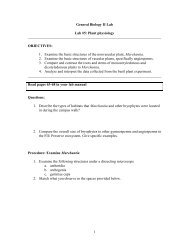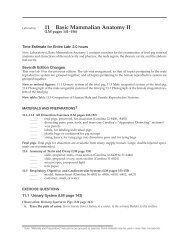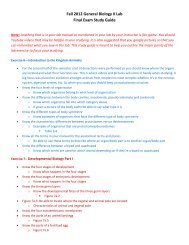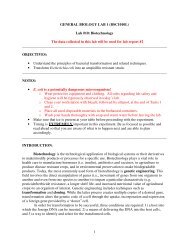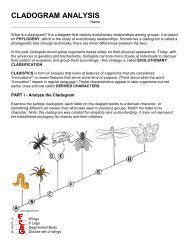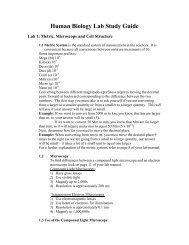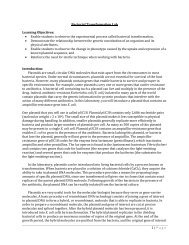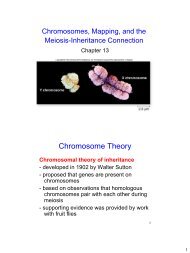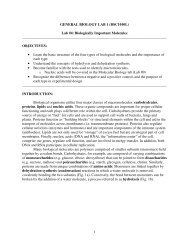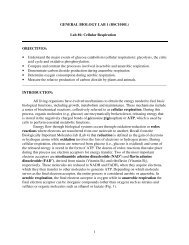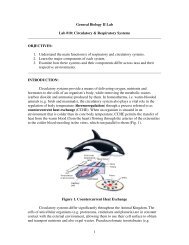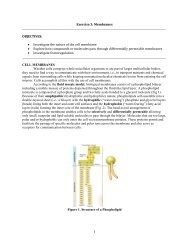Dangerous Fruit
Dangerous Fruit
Dangerous Fruit
- No tags were found...
You also want an ePaper? Increase the reach of your titles
YUMPU automatically turns print PDFs into web optimized ePapers that Google loves.
<strong>Dangerous</strong> <strong>Fruit</strong>By:-Michelle Pichardo -Luanna Santana-Shannon Duffy -Marie Pierre-Martin Drubb -Daveile Abbot
Symptoms• A Patient complains about various dizzy spells and feeling faint duringdifferent times of the month, and at various times of the day. He sweatsexcessively and becomes pale during the episodes, not to mention disoriented.He realizes that at the points where he is feeling these faint and nauseousperiods that his blood sugar reached very low (hypoglycemic) blood levels aslow as 25mg.• Questions:1. List the symptoms the patient is suffering from.2. What is a glucometer?3. What is hypoglycemia?4. What are current possibilities for the prognosis?
Eliminating Possibilities:Hypoglycemia• A possible diagnoses.• Chronic low blood glucose levels. Levels below 70 mg/dL• Normal glucose levels range from 82-110 mg/dL• Insulin regulates blood glucose levels when released by the pancreas into thebloodstream. It is a hormone that helps to lower glucose levels in the blood. Ithas the opposite effect of glucagon, which helps raise blood glucose levels.• Diabetes occurs when the pancreas does not release enough or any insulin intothe blood stream. As a result, blood glucose levels are higher than normal.Insulin must then be injected.• In the case of this patient hypoglycemia is eliminated because the episodes oftenoccur AFTER eating when blood glucose levels should be higher. And he wasnot diabetic therefore did not inject insulin.
Hypoglycemia
Eliminating Possibilities:His Kidney Disease.• Kidney Functions include:1. Serve as filters of the blood by eliminating wastes. Regulate electrolytes and helpmaintain a base-acid balance.2. Play a vital role in the elimination of toxic ammonium in the form of urea,previously produced in the urea cycle in the liver.3. Releases hormones that regulate blood pressure and calcium in bones.4. Reabsorb water, glucose, and amino acids.The possibility that the symptoms are caused by his kidneys are quicklyeliminated when blood work comes back normal. The only link to thekidneys would have been if the kidneys appeared more damaged and itcould’ve only happened if there was EXCESSIVE glucose levels, ratherthan low glucose levels.
Eliminating Possibilities:Malnutrition• The patient stated that he had a mostly vegetarian dietand when the body is not nourished properly, thesymptoms presented could easily occur.• However, the patient claims to have eaten minutesbefore various of the episodes. Or eats after an episodeoccurs for concern of low glucose• Leads way to what has the patient eaten? Is there apossible allergic reaction to something uncommon?
Importance of patientHistory discussion• What are some possible questions that could have beenasked to the patient to quickly diagnose the issue?o Have you done any traveling lately? If so where? Did you eatanything different? Are you allergic to anything?• If his sugar was going from normal to extremely highor low, asking if the patient had eaten anything henormally doesn’t eat would have been a big help indetermining the problem.
Actual Diagnosis• The patient revealed to the doctor that while in Jamaica he ate hisfavorite local specialty, ackee fruit.• When the fruit is not ripe it releases a chemical that does notallow the body to reach the livers backup glucose. As a result,blood glucose levels are lower than normal and not enoughenergy, in the form of ATP, is being produced. This explains thedizziness and disorientation, which were caused by an insufficientsupply of glucose to the brain.• The body still releases the normal amount of insulin, although itis not needed, causing the hypoglycemia.
Ackee fruitEating unripe ackee , the national fruit of Jamaica, cancause serious illnesses due to hypoglycin A. This toxinis present in unripe ackee (left) but degrades as the fruitripens (right)
Ackee <strong>Fruit</strong>
References• (2011). Kidney disease. Retrieved from National KidneyFoundation website:http://www.kidney.org/kidneydisease/• Dave, H. M. (2011). Ackee fruit toxicity. Retrieved fromhttp://emedicine.medscape.com/article/1008792-overview• Hypoglycemia. In A.D.A.M. Medical Encyclopedia.Retrieved fromhttp://www.ncbi.nlm.nih.gov/pubmedhealth/PMH0001423/



